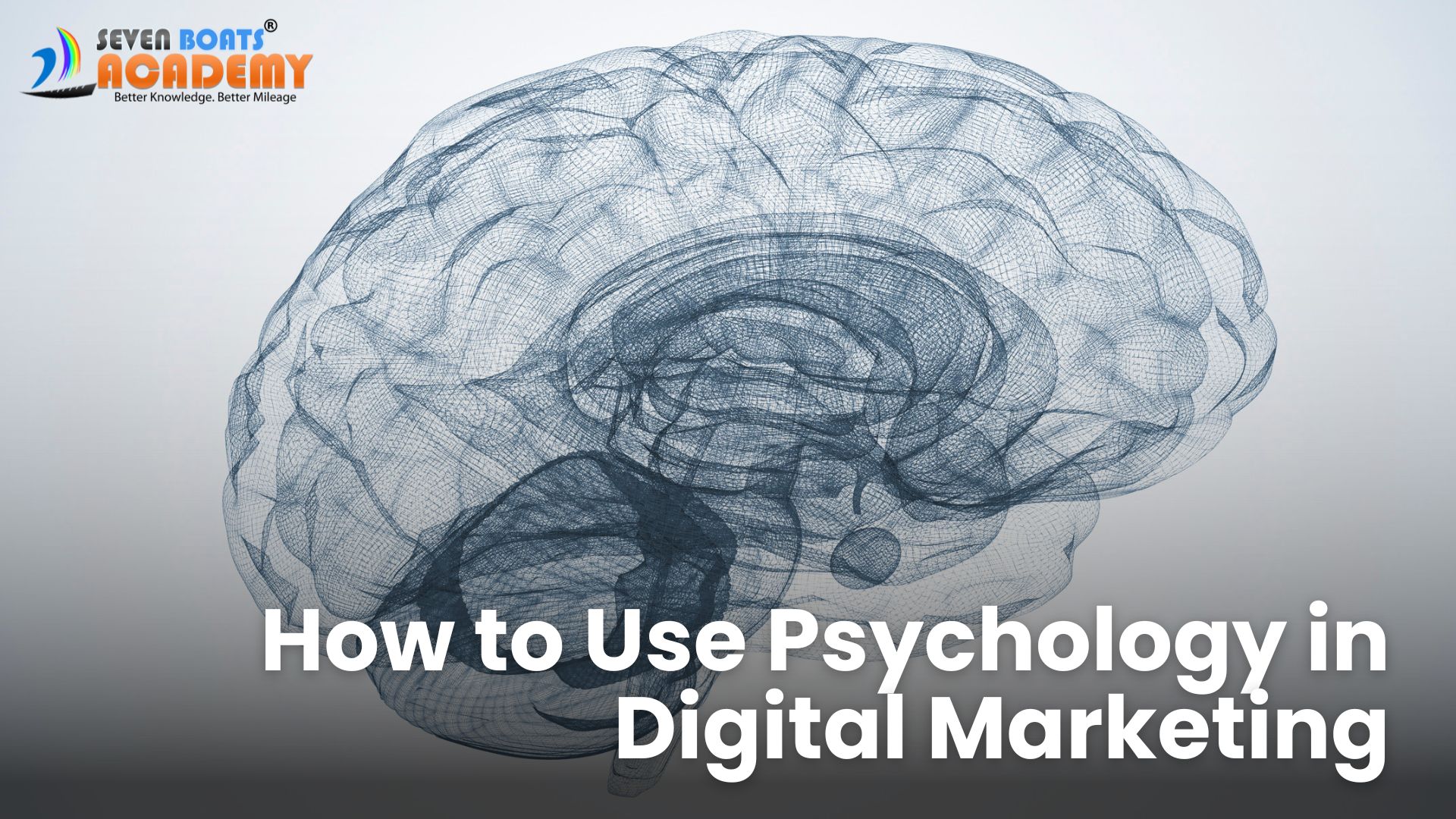
Digital marketing is a powerful tool that businesses can use to reach their target audiences more effectively. However, simply having a digital marketing strategy is not enough. To truly maximize the impact of your campaigns, it’s essential to incorporate psychology into your marketing efforts. Understanding the principles of human behavior and how people think can significantly improve your digital marketing results. In this blog, we will delve into the various ways you can use psychology in digital marketing to engage your audience, drive conversions, and build brand loyalty.
Understanding Your Audience
Know Your Target Audience
The first step in using psychology in digital marketing is to understand your target audience. Knowing who your customers are, what they need, and what motivates them is crucial for creating effective marketing campaigns.
- Demographics: Age, gender, income, education, occupation, etc.
- Psychographics: Interests, hobbies, lifestyle, values, attitudes, etc.
- Behavioral Data: Purchase history, product usage, brand loyalty, etc.
By gathering and analyzing this information, you can create detailed buyer personas that represent your ideal customers.
Empathy Mapping
Empathy mapping is a technique that helps you understand your customers’ experiences and emotions. It involves creating a visual representation of what your customers see, hear, think, feel, and do. This can help you identify pain points and opportunities to provide value.
Cognitive Biases in Digital Marketing
Leveraging the Scarcity Principle
The scarcity principle is a psychological phenomenon where people perceive something as more valuable when it is limited in availability. You can use this principle in your digital marketing efforts by:
- Limited-Time Offers: Create urgency by offering discounts or promotions for a limited time.
- Exclusive Products: Highlight the exclusivity of a product to make it more desirable.
- Low Stock Alerts: Inform customers when a product is running low in stock.
Utilizing Social Proof
Social proof is the idea that people tend to follow the actions of others. You can leverage social proof in your digital marketing by:
- Customer Reviews and Testimonials: Showcase positive feedback from satisfied customers.
- User-Generated Content: Encourage customers to share their experiences with your product on social media.
- Influencer Endorsements: Partner with influencers to promote your brand.
The Power of Persuasion
Cialdini’s Six Principles of Persuasion
Dr. Robert Cialdini, a renowned psychologist, identified six principles of persuasion that can be applied to digital marketing:
- Reciprocity: People feel obligated to return favors. Offer something valuable for free, like an ebook or a free trial, to encourage reciprocation.
- Commitment and Consistency: People like to be consistent with their past behavior. Encourage small commitments, like signing up for a newsletter, which can lead to larger commitments, like making a purchase.
- Social Proof: As mentioned earlier, people follow the actions of others.
- Authority: People respect authority figures. Use expert endorsements and professional design to establish credibility.
- Liking: People are more likely to be influenced by people they like. Build rapport with your audience through relatable content and genuine interactions.
- Scarcity: People want more of what they can have less of.
The Role of Emotions in Marketing
Emotional Branding
Emotional branding is about creating a deep emotional connection with your audience. This can lead to increased brand loyalty and advocacy. Here are some ways to incorporate emotional branding into your digital marketing:
- Storytelling: Share compelling stories that resonate with your audience’s values and emotions.
- Visual Content: Use images and videos that evoke emotions and create a memorable experience.
- Music and Sound: Incorporate music and sound effects that enhance the emotional impact of your content.
Color Psychology
Colors can evoke specific emotions and influence behavior. Understanding color psychology can help you choose the right colors for your brand and marketing materials. For example:
- Red: Creates a sense of urgency and excitement.
- Blue: Conveys trust and reliability.
- Green: Associated with health and tranquility.
- Yellow: Evokes happiness and optimism.
Crafting Compelling Messages
The Power of Words
The words you use in your digital marketing campaigns can have a significant impact on your audience. Here are some tips for crafting compelling messages:
- Use Action-Oriented Language: Encourage your audience to take action with strong verbs like “discover,” “learn,” and “join.”
- Create a Sense of Urgency: Phrases like “limited time offer” or “act now” can motivate people to act quickly.
- Highlight Benefits: Focus on the benefits your product or service provides, rather than just the features.
A/B Testing
A/B testing is a method of comparing two versions of a webpage or ad to see which one performs better. This can help you determine which messages resonate most with your audience. Key elements to test include:
- Headlines: Try different headlines to see which one captures attention.
- Call-to-Actions (CTAs): Experiment with different CTA buttons and phrases.
- Images and Videos: Test different visuals to see which ones are more engaging.
Building Trust and Credibility
Transparency and Authenticity
In today’s digital age, consumers value transparency and authenticity. Building trust with your audience is crucial for long-term success. Here are some ways to build trust and credibility:
- Be Honest: Always be truthful in your marketing messages. Avoid making exaggerated claims or hiding important information.
- Show Behind-the-Scenes: Share behind-the-scenes content to give your audience a glimpse into your company culture and processes.
- Engage with Your Audience: Respond to comments and messages promptly and genuinely.
Security and Privacy
Ensuring the security and privacy of your customers’ data is essential for building trust. Make sure your website is secure and complies with privacy regulations. Communicate your commitment to data security and privacy to your audience.
The Impact of User Experience (UX)
Simplifying Navigation
A seamless and intuitive user experience is essential for keeping visitors on your website and encouraging them to take action. Here are some tips for improving UX:
- Clear Navigation: Ensure your website has a clear and simple navigation structure.
- Fast Loading Times: Optimize your website’s loading speed to prevent visitors from leaving.
- Mobile-Friendly Design: Make sure your website is responsive and works well on all devices.
Personalization
Personalization involves tailoring your marketing efforts to individual customers based on their preferences and behavior. This can enhance the user experience and drive conversions. Here are some ways to personalize your digital marketing:
- Email Marketing: Use personalized subject lines and content in your emails.
- Product Recommendations: Show personalized product recommendations based on past purchases or browsing behavior.
- Dynamic Content: Customize website content based on the visitor’s location, behavior, or preferences.
Using Data and Analytics
Tracking and Measuring Success
Data and analytics are crucial for understanding the effectiveness of your digital marketing efforts. Here are some key metrics to track:
- Website Traffic: Monitor the number of visitors to your website and the sources of traffic.
- Conversion Rates: Track the percentage of visitors who complete a desired action, such as making a purchase or signing up for a newsletter.
- Engagement Metrics: Measure the level of engagement with your content, such as likes, shares, and comments.
Using Analytics Tools
There are various analytics tools available that can help you track and measure your digital marketing performance. Some popular tools include:
- Google Analytics: A comprehensive tool for tracking website traffic and user behavior.
- Social Media Analytics: Built-in analytics tools on platforms like Facebook, Instagram, and Twitter.
- Email Marketing Analytics: Tools provided by email marketing platforms like Mailchimp and Constant Contact.
Case Studies and Examples
Successful Digital Marketing Campaigns
Examining successful digital marketing campaigns can provide valuable insights and inspiration. Here are a few examples of brands that have effectively used psychology in their digital marketing:
- Coca-Cola: Known for its emotional branding and storytelling, Coca-Cola’s “Share a Coke” campaign personalized bottles with people’s names, creating a personal connection with consumers.
- Airbnb: Airbnb uses social proof by showcasing user-generated content and reviews from guests to build trust and credibility.
- Amazon: Amazon’s recommendation engine uses personalization to suggest products based on browsing and purchase history, increasing the likelihood of conversions.
Conclusion
Incorporating psychology into your digital marketing efforts can significantly enhance your ability to connect with your audience, drive conversions, and build brand loyalty. By understanding your audience, leveraging cognitive biases, using persuasive techniques, and creating an emotional connection, you can create more effective and impactful marketing campaigns. Additionally, focusing on trust, user experience, personalization, and data-driven decision-making will further optimize your digital marketing strategy. Remember, the key to successful digital marketing is to understand and appeal to the human psyche.



1 responses on "How to Use Psychology in Digital Marketing"